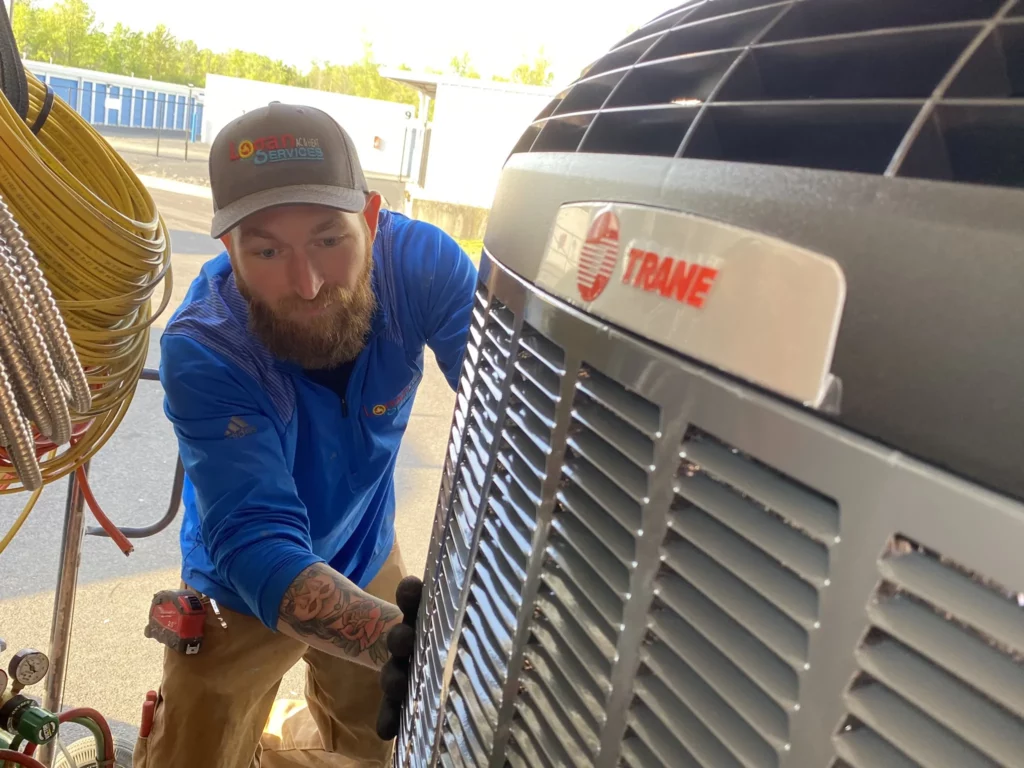When it comes to cooling your home during hot summer months, a reliable and efficient AC unit is essential. But there are plenty of AC units on the market.
So how do you know which one is right for your home? And once you’ve chosen your unit, how do you properly maintain and troubleshoot it?
This article is a comprehensive guide to AC units, covering everything from the different types of units available to key components and maintenance tips.
Different Types of AC Units
There are various types of air conditioners available today, each offering unique benefits and suited for different spaces and applications. Let’s take a look at these units and their unique benefits.
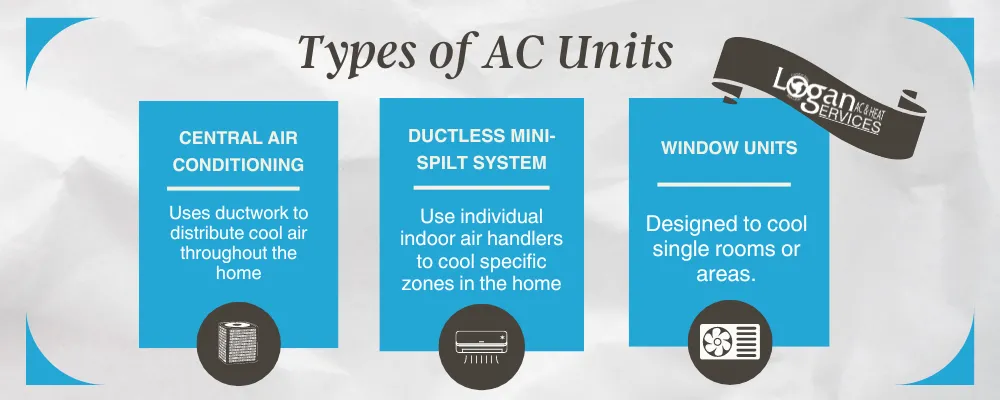
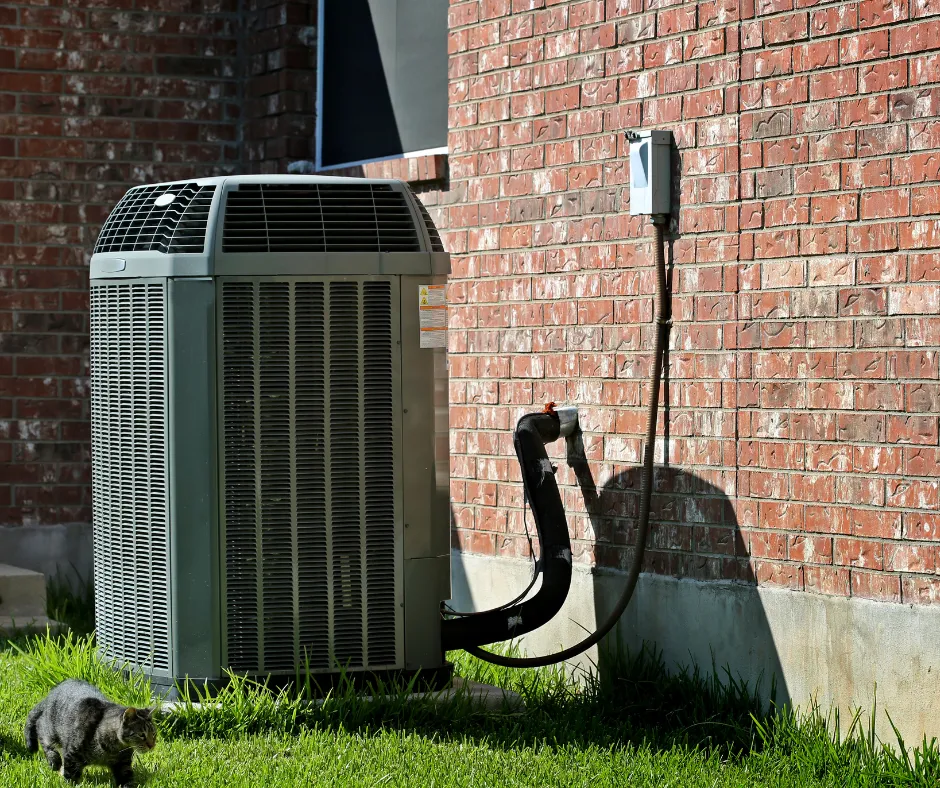
Central Air Conditioning Systems
Central air conditioning systems are widely used in residences and commercial spaces. They are composed of an outdoor condenser unit connected to an air handler or furnace, which is responsible for distributing the cooled air throughout the building through ductwork. Central AC units, depending on their age and SEER/SEER2 ratings, are typically more energy-efficient than other types of air conditioners and provide consistent, even cooling throughout the space.
One major advantage of central air conditioning systems is their ability to cool multiple rooms simultaneously. However, as they require extensive ductwork and installation can be more involved and costly in comparison to other units. Central air conditioning systems are great for larger spaces where comprehensive climate control is desired.
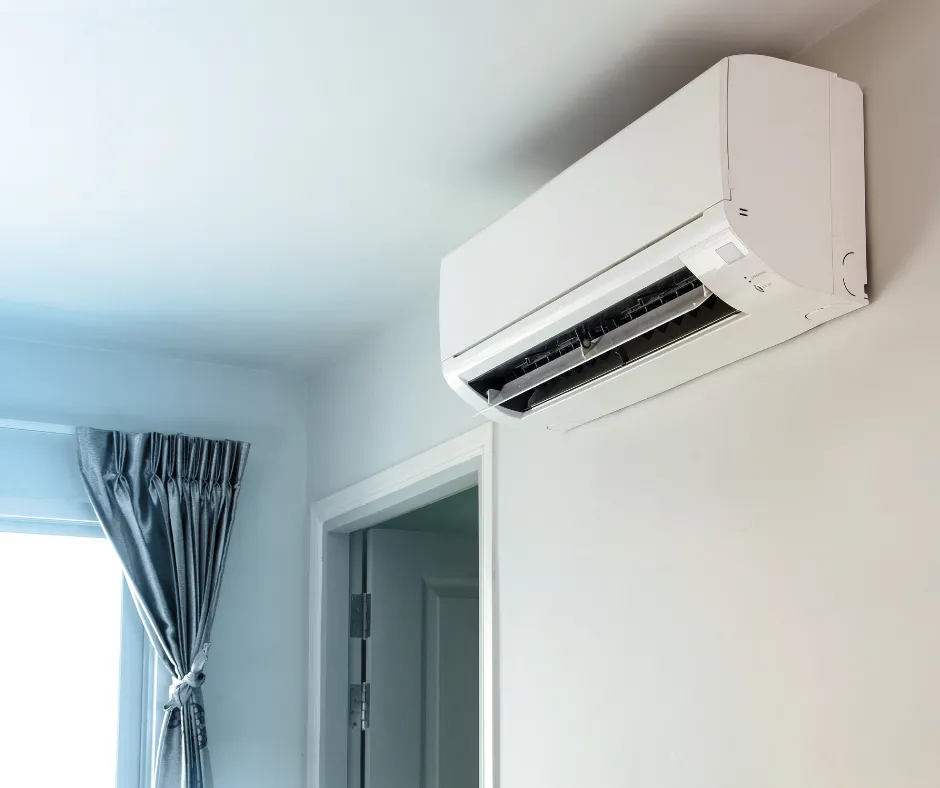
Ductless, Mini Split Air Conditioners
Ductless, mini split air conditioners are a versatile, energy-efficient solution for cooling individual rooms or small spaces. These systems include an outdoor compressor and an indoor air-handling unit mounted on the wall, connected by refrigerant tubing and electrical wiring. They offer the convenience of being easily installed and controlled independently for ultimate comfort and customization.
One main advantage of ductless, mini split air conditioners is the lack of ductwork, which reduces the risk of energy loss and can make installation easier. They are perfect for retrofitting older homes or providing supplemental cooling in specific areas. However, these units aren’t always best for cooling an entire home, as multiple indoor units will be required, which can increase the cost of the investment significantly.
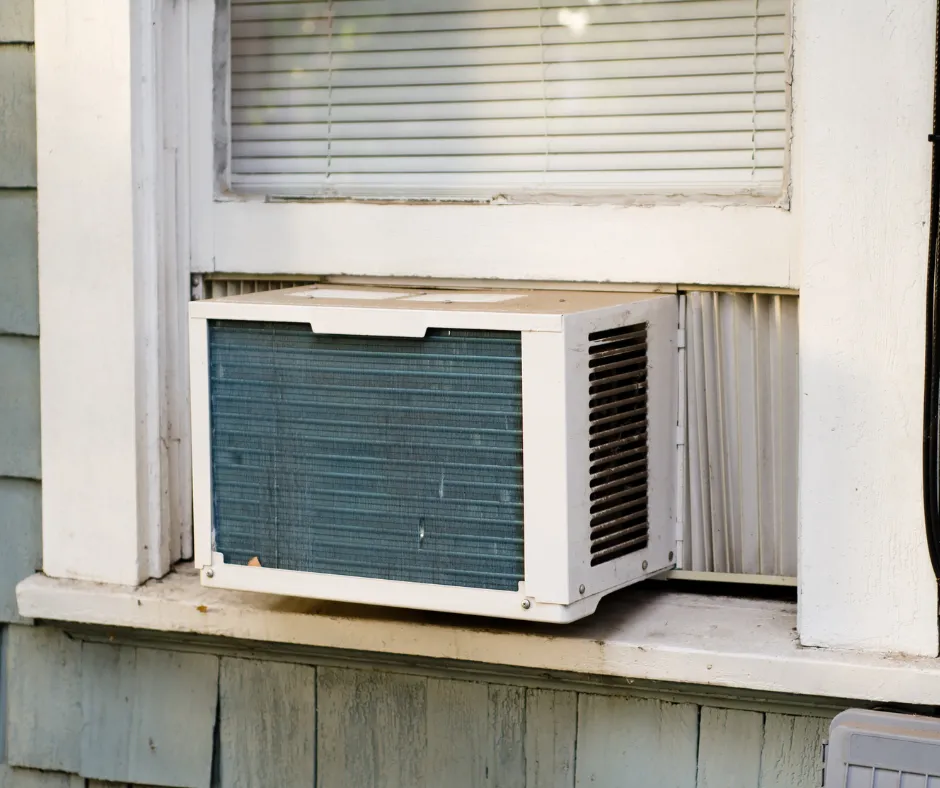
Window Units
Window air conditioners are more affordable and straightforward options for providing cooling to individual rooms or small spaces. These units are mounted in a window or through a hole in the wall. They work by gathering hot air from a room and releasing it outside.
Window acs are typically easy to install, portable, and require minimal maintenance. However, window units can be noisy, and they may not be as energy efficient as other types of air conditioners. Additionally, they are not suitable for large spaces or homes that require comprehensive cooling.
Key Components of an AC Unit
Understanding the critical components of an air conditioning unit can help you make a more informed decision when selecting the best option for your needs. The main components include the compressor, condenser coil, evaporator coil, and thermostat.
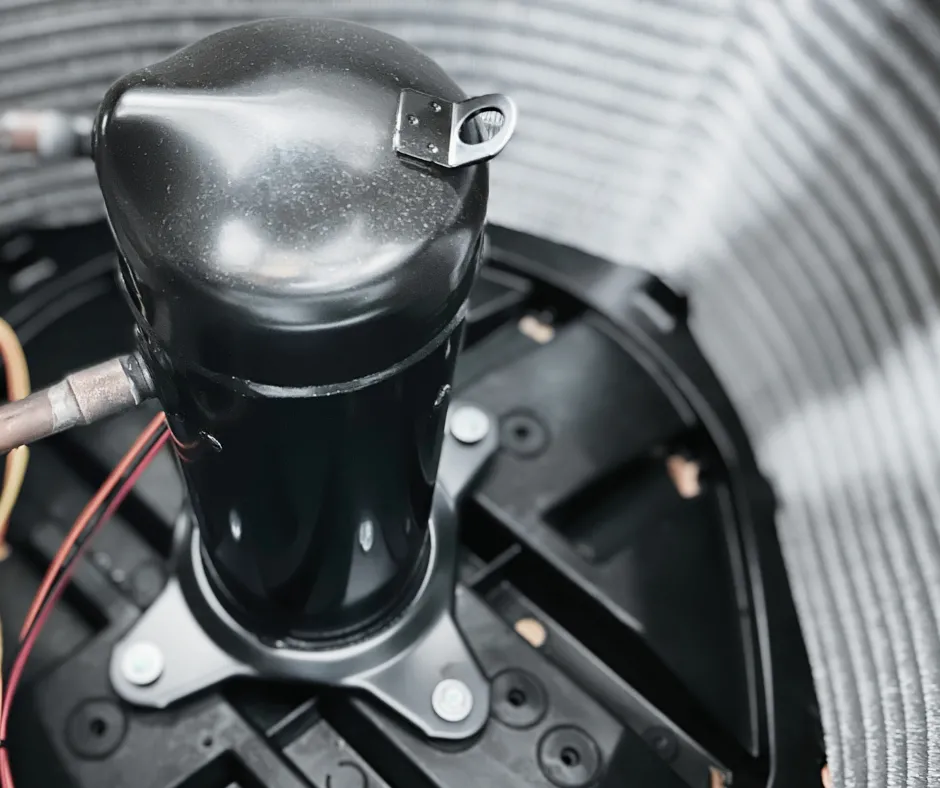
Compressor
The compressor’s primary function is to circulate refrigerant between the condenser and evaporator coils. This process changes the refrigerant’s state from a low-pressure gas to a high-pressure gas, enabling heat transfer and cooling to occur. Compressors play a vital role in the overall efficiency of an air conditioning system.
It is essential to choose an AC unit with a compressor that has adequate capacity for your space and climate.
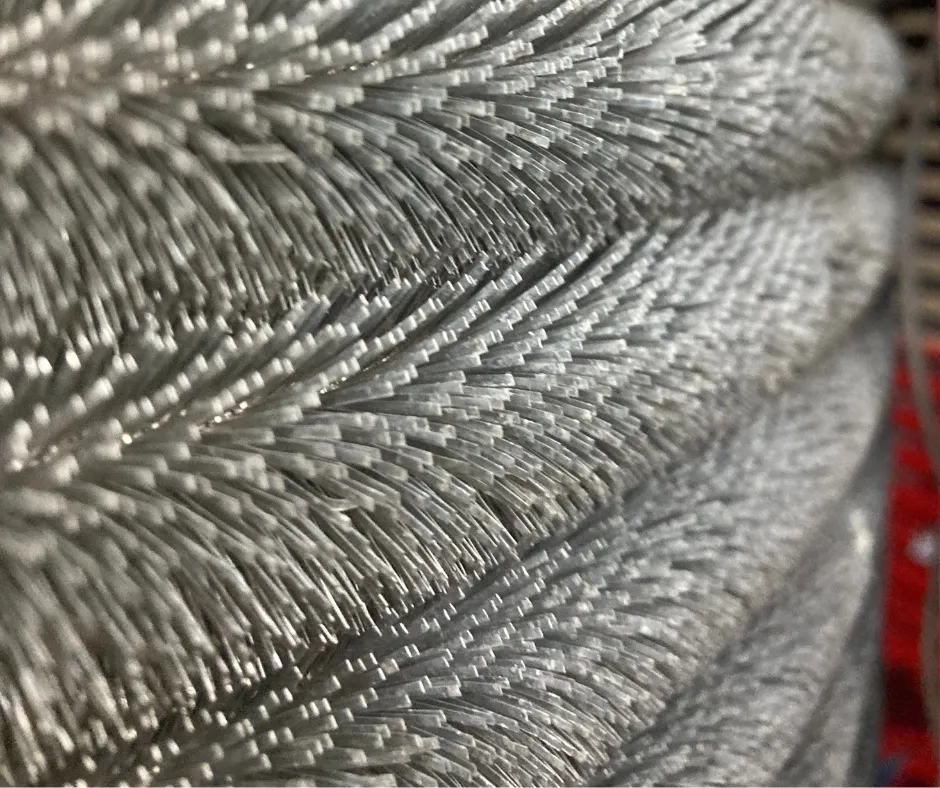
Condenser Coil
The condenser coil is responsible for releasing the heat absorbed from indoors to the outside environment, and this part is located in the outdoor unit of AC systems. As the compressor pushes high-pressure gas through the coil, a fan helps dissipate the heat, condensing the refrigerant back into a liquid state.
The condenser coil needs to be cleaned regularly, as dirt and debris can impede heat transfer and reduce the system’s efficiency.
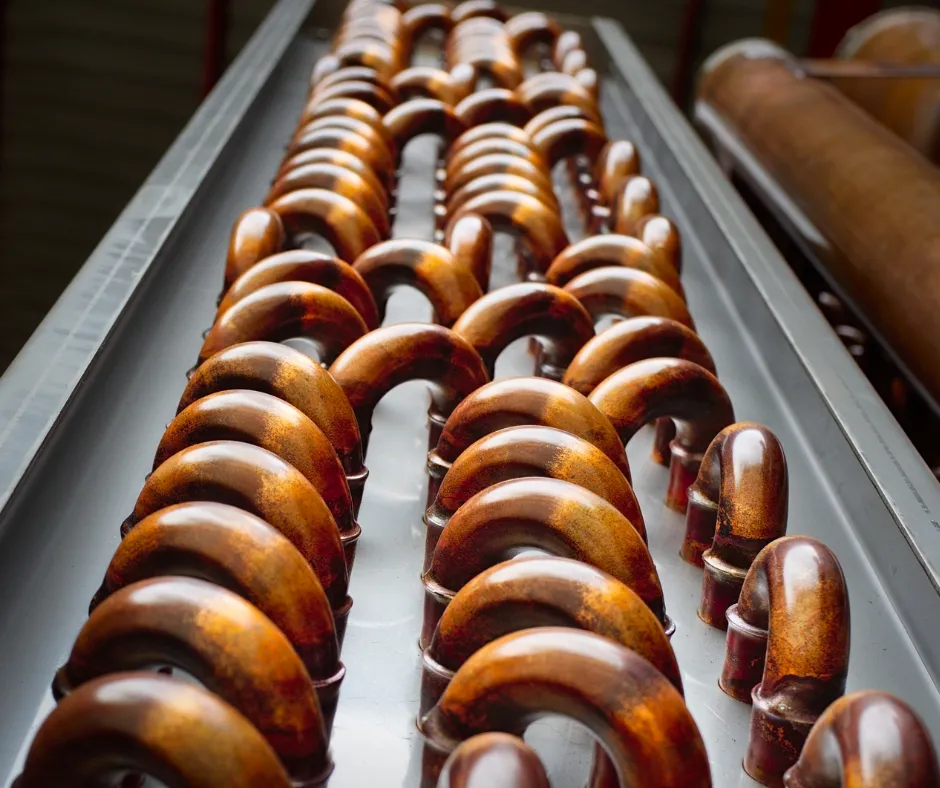
Evaporator Coil
The evaporator coil is found inside the indoor unit of an air conditioning system. It functions by absorbing heat from the indoor air, which lowers the temperature and creates a cool, comfortable environment. As warm air is drawn across the evaporator coil, the refrigerant inside evaporates, changing from a liquid to a gas, and then returns to the compressor to begin the cycle again.
To ensure optimal performance, the evaporator coil should be cleaned and inspected periodically as part of routine maintenance.
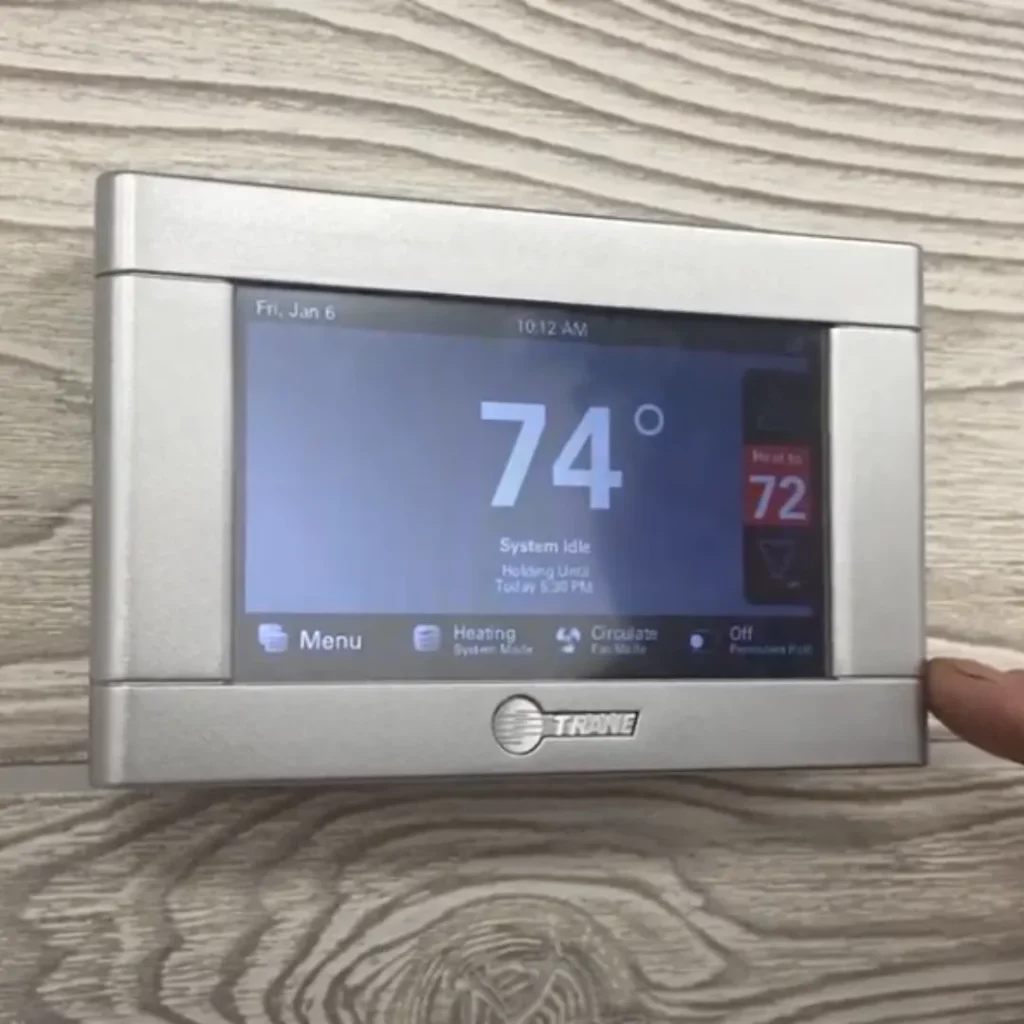
Thermostat
The thermostat functions as the “brain” of the air conditioning system, allowing users to set and maintain a desired temperature within their space. There are various models of thermostats available, ranging from simple manual models to more advanced programmable and smart thermostats that offer energy-saving features and remote-control capabilities. A thermostat is essential for regulating indoor comfort and managing overall system operation.
Understanding the different types of AC units and their key components can significantly impact your decision-making when choosing a new air conditioning system. By considering factors such as space, energy efficiency, and installation requirements, you can ensure that you choose the optimal solution to maintain comfort and keep your energy costs in check.
How to Choose the Right AC Unit for Your Home
No two homes are alike, and selecting the best air conditioning unit for your space can be a challenging task. You need to consider factors like your cooling preferences, your home’s size, and your budget. Remember that it’s best to consult with professionals when choosing an AC unit, as they can assess your space and guide you to make the best decision.
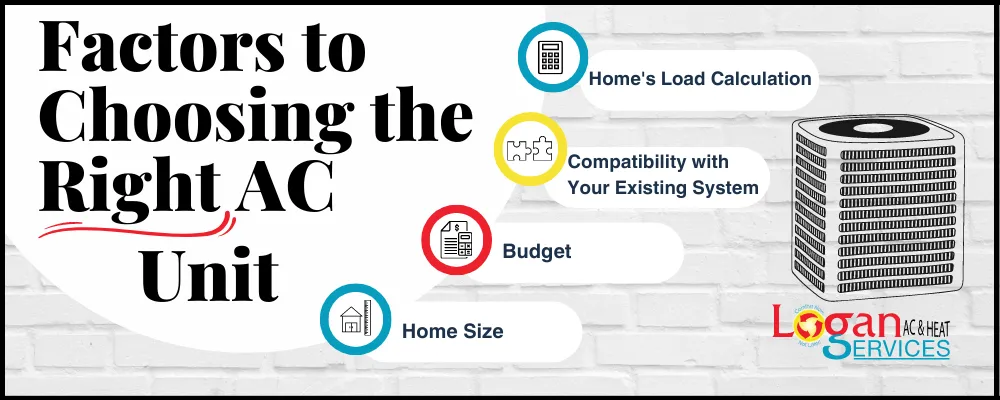
In this section, we’ll outline key factors to consider when choosing an AC unit for your home.
Calculating Your Home’s Cooling Needs
To determine the appropriate air conditioning capacity, an HVAC professional will need to calculate your home’s cooling needs, which are determined by multiple factors, including the size and the insulation quality of your home. In addition, factors like the number of windows or occupants in your home can also influence the appropriate AC capacity.
With AC unit sizing, your equipment will be measured in tons. A ton is a term that describes how much heat the AC unit can remove from a home in one hour. It’s always best to have an HVAC professional perform a load calculation to determine what air conditioner tonnage you require, which can range from roughly 1.5 tons to 3 tons to 5 tons.
Energy Efficiency and SEER Ratings
Energy efficiency should be a major consideration when selecting an AC unit. Look for high-efficiency units with a higher SEER/SEER2 (Seasonal Energy Efficiency Ratio) rating – the higher the rating, the more energy-efficient the AC unit is. Besides being environmentally friendly, energy-efficient air conditioners can also save you a significant amount of money on your energy bills.
Most newer AC units have a SEER/SEER2 rating between 13 and 21, while more outdated models may have a rating below 10. It’s generally recommended to choose an AC unit with a SEER/SEER2 rating of at least 14 or higher, depending on your climate and cooling needs.
Compatibility with Your Existing System
If you are upgrading or replacing an existing AC unit, it’s crucial to ensure compatibility with your current technology and components, such as your furnace, ductwork, electrical system, and thermostat. Incompatible systems can lead to inefficiency and increased energy consumption, negating any potential savings from a new AC unit.
Before purchasing a new AC unit, consult with an HVAC professional to determine which models and components will work best with your existing system. They can also provide suggestions for upgrading your ductwork or electrical system to maximize your new AC unit’s efficiency and performance. The team at Logan AC & Heat services has decades of experience in selecting and installing AC units and can use our expert guidance to find the best unit for your space.
Maintenance and Troubleshooting Tips for AC Units
If you properly maintain your air conditioning unit, you can prevent common issues, extend the unit’s life, and improve its overall performance. In this section, we will cover essential tips for maintaining your AC unit, as well as some troubleshooting advice for when issues arise.
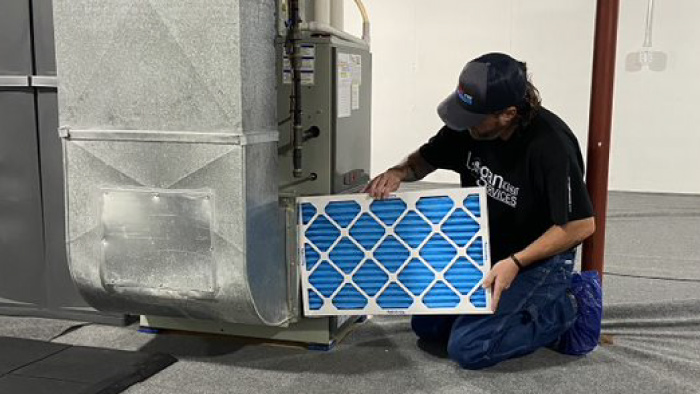
Regularly Inspecting and Replacing Filters
An effective way to maintain your AC unit is regularly inspecting and replacing its filters. Clogged or dirty filters restrict airflow, reduce efficiency and can even cause your AC unit to freeze up or break down.
Most filters need to be replaced every 1-3 months. However, this depends on the filter type and usage. High-efficiency pleated filters, as well as the replacement medias for the Logan Services’ Perfect Air Plus electronic filter, can typically last longer and need replacement less frequently than standard filters. Be sure to consult your AC unit’s manual or HVAC specialist for specific recommendations on filter replacement frequency.
Time for new furnace filters? Shop our ONLINE FILTER STORE >>
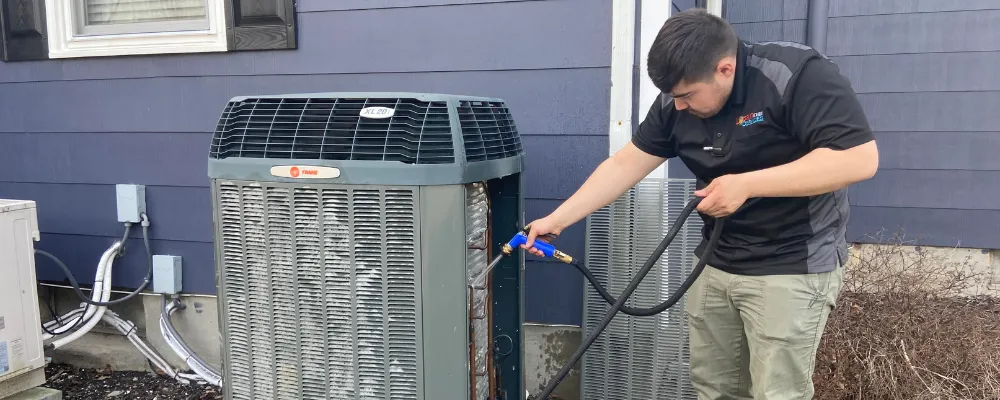
Cleaning and Maintaining the Condenser
The condenser, located in the outdoor portion of your AC unit, is crucial in the cooling process. It releases the heat absorbed by the refrigerant, allowing the cooled air to be distributed throughout your home. To maintain your condenser, keep the area around your AC unit free of dirt, grass, leaves, and other debris.
Additionally, clean the condenser’s fins and coils using a gentle stream of water or a soft brush. This helps remove accumulated grime. However, watch the delicate fins and be careful not to damage them. Bent fins can hurt airflow and efficiency.
Professional Maintenance and When to Call for Help
While there is plenty of DIY maintenance you can perform on your AC unit, some tasks should be left to professionals. It’s recommended to have an HVAC expert perform a routine inspection and maintenance on your AC unit at least once a year. This maintenance typically includes checking refrigerant levels, testing electrical components, confirming the proper operation of the blower, and ensuring that the equipment has adequate airflow.
If you notice warning signs like strange noises, leaks, or significant temperature inconsistencies, call a professional for help. Preventative maintenance and prompt attention to issues can keep your AC unit running efficiently and extend its lifespan.
About Logan AC & Heat Services
Logan AC and Heat Services has been proud to call Ohio it’s home since 1969. We are a family owned and operated company specializing in HVAC installation and services. Whether you are looking to replace your existing AC unit, have maintenance questions, or need help with another part of your HVAC system, we’re here for you. With outstanding customer service and attention to detail, you can count on Logan to do a quality job every time. Contact us today to get started.
FAQs – Air Conditioning Units
What are the different types of AC units?
There are several types of air conditioning systems, each serving a specific purpose and catering to different spaces. The primary types include:
- Central air conditioner
- Window air conditioner
- Split or ductless air conditioner
- Portable air conditioner
- Hybrid air conditioner
- Geothermal air conditioner
How do I choose the right AC unit size for my home?
Selecting the proper AC unit size is crucial for ensuring efficient cooling and energy consumption. Experts recommend using the “Manual J” method for accurately determining the size appropriate for your home. The calculation considers factors such as house size, insulation, window area, and regional climate to provide a recommendation.
What is SEER and why is it important?
SEER stands for Seasonal Energy Efficiency Ratio. This metric determines the energy efficiency of an air conditioning unit. A higher SEER/SEER2 rating means better energy efficiency and reduced energy costs.
Federal regulations mandate a minimum SEER rating of 14 in 2023 for air conditioning units; however, some regions may require even higher ratings due to hotter climates.
Why is regular AC unit maintenance important?
Regular maintenance of your AC unit ensures its efficiency and extends its lifespan. Some benefits of routine maintenance include:
- Lower energy consumption
- Improved indoor air quality
- Preventing expensive repairs
- Prolonged equipment lifespan
Typical maintenance tasks include cleaning filters, inspecting electrical components, examining the thermostat, and checking for refrigerant leaks. Most experts recommend annual or biannual maintenance for optimal performance.

